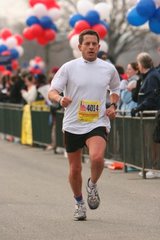Finally, a moment to breathe. Up until 2a this morning, working on the day job. I suppose it's also been turning into the day-and-night job. But I'm getting stuff done. Including catching up on the blog and (just about) finishing the framing. Nailed in most of the cross braces early this evening. Work allowing, I'll throw up the roof trusses tomorrow during lunch, then (maybe) put some more corner bracing around the sides after work.
Random thoughts. Here's one, courtesy of
Slate and
NPR and Lt. Gen. Douglas Lute, the "war czar" who's deputy national security advisor for Iraq and Afghanistan:
NPR: You know, given the stress on the military and the concern about these extended deployments for an all-volunteer military, can you foresee, in the future, a return to the draft?
Lute: You know, that's a national policy decision point that we have not yet reached, Michele, because the —
NPR: But does it make sense militarily?
Lute: I think it makes sense to certainly consider it, and I can tell you, this has always been an option on the table, but ultimately, this is a policy matter between meeting the demands for the nation's security by one means or another. Today, the current means of the all-volunteer force is serving us exceptionally well. It would be a major policy shift — not actually a military, but a political policy shift to move to some other course.
And here's a gentle reminder from the Selective Service System:

Speaking of things military, the stepdaughter is back from a monthlong road trip. Don't see any huge rush to get to her Army recruiter.
A depressing story, courtesy of the
Wall Street Journal:
OUT TO PASTURE
Why Deere Is Weeding Out
Dealers Even as Farms Boom
Some Veteran Retailers
Feel Betrayed By Shift;
'We Are Not a Family'
By ILAN BRAT and TIMOTHY AEPPEL
August 14, 2007; Page A1
MOLINE, Ill. -- For more than a century, Deere & Co. has relied on dealers to sell its iconic John Deere tractors and other farm equipment. Deere dealers like to brag that they "bleed green," the company's trademark color.
![[Robert Lane]](http://online.wsj.com/public/resources/images/HC-GK514_Lane_20070813212031.gif)
But even as the farm boom helps Deere harvest record profits, dozens of North American dealerships are getting sent out to pasture, including some that have passed through families for generations. Chief Executive Robert Lane says times have changed. In an age when tractors use satellites to track the location of every seed, he says, dealers must match the sophistication and size of agribusiness customers.
"For years we talked about Deere as a family," says Mr. Lane, a former banker. "The fact is, we are not a family. What we are is a high-performance team....If someone is not pulling their weight, you're not on the high-performance team anymore."
Deere's overhaul is one answer to a challenge faced by many large businesses that distribute their products through independent retailers. These retailers are supposed to know the local turf and market the product more effectively than a big corporation could. But if the retailers are too small-scale, their inefficiencies could outweigh the advantages.
To some Deere dealers, the transition feels like a betrayal. Raymond Warren spent 34 years working his way up from salesman to owner of a dealership in Wakefield, Va. In late 2002, Mr. Warren says he began receiving letters, emails and visits from Deere officials almost monthly urging him either to bulk up by acquiring another dealer or cash out. (Deere declined to comment on individual cases.) He finally sold to another dealer in 2005.
On the bright side, these next people really don't get enough credit. Again, courtesy of the
WSJ. If you don't have a subscription ... buy one. Don't know what you think of Murdoch. Don't much care. Even at $99/year ($49 if you've got a print subscription), it's still a good deal.
Here.
HEALTH JOURNAL By TARA PARKER-POPE |  |
|
|
|
Beyond Winning: A Team
With a Message About Health
August 14, 2007; Page D1
Most people view illness as a handicap. But cyclist Phil Southerland, who has Type 1 diabetes, believes his disease gives him an unusual advantage, both on and off the bike.
The reason? Type 1 diabetes has forced Mr. Southerland to take charge of his health every minute of every day. There is never a time when he doesn't think about the food he is eating, how much exercise he is getting and whether he has taken his medication. This meticulous attention to health is a matter of life or death for anyone with Type 1, which requires vigilant monitoring of blood-sugar levels and the balancing of meals, snack, exercise and insulin injections.
MORE
![[Go to discussion]](http://online.wsj.com/public/resources/images/it_bicycle09162005160024.gif) 1
1 Has a medical condition ever gotten in the way of your ability to exercise or eat well? What did you do to overcome the situation?
Share your thoughts2. Plus, Tara Parker-Pope answers reader questions in
Health Mailbox3.
But Mr. Southerland, who was diagnosed when he was seven months old, believes the daily life of someone with Type 1 has lessons for all of us. "For people with Type 1, it's all about tight control of their health," says Mr. Southerland, who lives in Atlanta. "I want people to take charge and realize their life is in their hands, and nobody else's."
Mr. Southerland, 25, is hoping that he can do for diabetes care and prevention what cyclist Lance Armstrong has done for cancer, inspiring healthy people to take better care of their bodies and serving as a role model for kids with diabetes. He is the founder of Team Type 1, a cycling team made entirely of riders who have Type 1 diabetes.
![[Phil Southerland of Team Type 1]](http://online.wsj.com/public/resources/images/PJ-AK733_pjHEAL_20070813200116.jpg) |
| Phil Southerland of Team Type 1 |
Team Type 1 is a force to be reckoned with in the cycling world. In June, Team Type 1 won the 3,053-mile Race Across America relay, beating seven other eight-member teams by cycling from Oceanside, Calif., to Atlantic City, N.J., in five days, 15 hours and 43 minutes.
About 21 million people in the U.S., or about 7% of the population, have a form of diabetes. The most common form is Type 2, in which the body doesn't produce enough insulin or the cells ignore the insulin. It is linked to obesity and often can be prevented and controlled with diet and exercise.
Type 1 diabetes is an autoimmune disease in which the body's immune system mistakenly destroys the body's ability to make insulin, a hormone needed to convert sugar and other food into energy needed for daily life. Type 1 cannot be controlled with diet alone. And because exercise can cause blood-sugar levels to drop precipitously, athletes with Type 1 face special challenges.
But new technology has made it easier for diabetic athletes. The cycling team uses continuous glucose monitors, which track blood sugar constantly and sound alarms if it goes outside of safe ranges. Team members also use wireless insulin pumps, which deliver insulin as needed without a tangle of tubes and wires.




 A breakout this morning -- about 20 chickens (mostly New Hampshire Reds) flew the coop. We caught them all, but it was still a little alarming. I should have some words with them. Maybe a little guilt? "I feed you. I give you fresh water and whole corn. I build a new barn for you and double your yard space. And this is how you repay me?"
A breakout this morning -- about 20 chickens (mostly New Hampshire Reds) flew the coop. We caught them all, but it was still a little alarming. I should have some words with them. Maybe a little guilt? "I feed you. I give you fresh water and whole corn. I build a new barn for you and double your yard space. And this is how you repay me?"
![[Robert Lane]](http://online.wsj.com/public/resources/images/HC-GK514_Lane_20070813212031.gif)
![[Phil Southerland of Team Type 1]](http://online.wsj.com/public/resources/images/PJ-AK733_pjHEAL_20070813200116.jpg)














